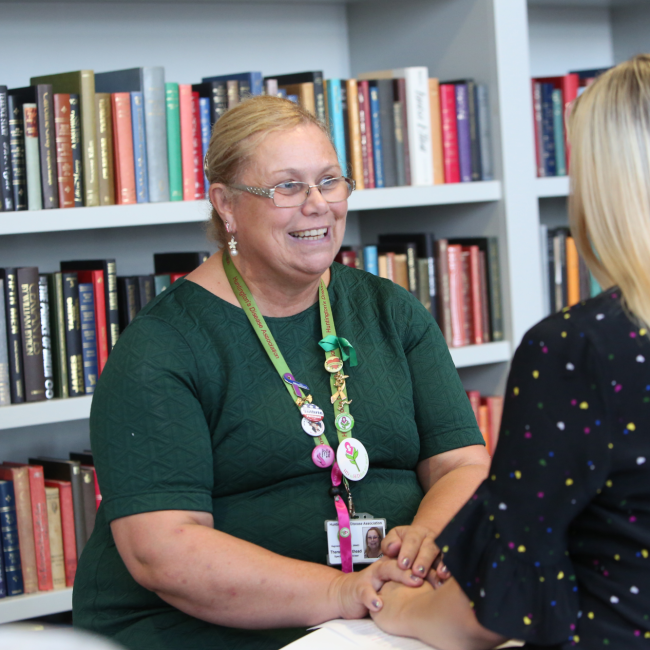Specialist Huntington's Disease Advisers
Our Specialist Advisers are just on the other end of the phone if you have any questions or require support.
Helpline:
As well as our Specialist Huntington's Disease Advisers, we have volunteer-run branch and support groups across England and Wales which are a great way to access peer support. We also have many ways that we offer support online through video resources and social media channels.

Our Specialist Advisers are just on the other end of the phone if you have any questions or require support.

We have a Facebook, Instagram, Twitter and TikTok channel each are updated frequently with news, stories, tips and advice.

Speaking to other people in a similar situation helps to spread the load and get peer to peer advice and support.

We have a wide range of videos to help you understand different ways of managing the disease.

You can call our helpline between 9am - 5pm Monday - Friday and speak to Kim for advice.

Join our young adults WhasApp group.

Talking therapies, such as Cognitive Behavioral Therapy (CBT), counselling, other therapies, and guided self-help.

A full guide on being a young adult and navigating Huntington's disease.
The best place to keep up to date with research news is through HDBuzz. This is a great source of information that has been written in a way that is easy to understand.
Although taking part in research may sound daunting, research and studies come in many forms. Some may require you to speak to them about your experience, others may want you to help them develop something such as an app that may help people living with Huntington's further down the line. You can find out more about current studies in this section of the website.
There is also the opportunity to register with Enroll-HD - the largest research platform for people affected by Huntington's disease. They aim to accelerate the development of therapies for Huntington's disease by collecting more uniform clinical data and biological samples to better understand the natural history of Huntington's.
You can find out more about Enroll-HD on the link below.
Living well
Modern day life is busy. Most of us have to juggle many things – long work hours, relationships, family commitments, social lives.
Most people will have heard of the following mantras:
Healthy living can benefit everyone, leading to improved mental health, a greater sense of control over life and a better ability to cope when the going gets tough. It’s very important to take time out for relaxation and ‘me time’. These principles can be especially relevant for people who are at risk of or living with Huntington’s disease.
Another well-known phrase: ‘use it or lose it’. A less familiar term is ‘neural reserve’ or 'brain resilience'. The use it or lose it principle refers to doing things now, so you build your capacity up to be stronger in the future.
Imagine a man who has a go riding a unicycle. His first try is not good; he manages just two rotations of the pedals before falling off. This difficult action of unicycling has, however, resulted in different cells throughout the brain firing, which leads to a kind of circuit of neurons activating together.
He then decides to have a go the next day. Again, this network of neurons fire together and this time, connect a bit more strongly. After this he then decides that he will train in unicycling and does it for an hour each day. By doing this, he strengthens his neuronal network every single time.
How is this man’s unicycling relevant to Huntington’s?
Exercise has been shown to have many benefits for people of all ages and every level of fitness and health. Some of these benefits can include improved mood, concentration, cardiovascular conditioning and improved strength, balance and coordination.
Currently research is underway in Europe and the U.S.A, with people with early-mid stage Huntington’s, to determine the possible benefits of various types of physiotherapy-led exercise programs.
Physiotherapists are trained in understanding the effects of movement disorders such as Huntington’s. They can help you to understand the potential physical motor symptoms and progression of the disease, and can prescribe exercises and activities that are appropriate for your own specific needs.
The Physiotherapy Working Group of the European Huntington’s Disease Network (EHDN) has made the following recommendations for people who are at risk of Huntington’s, or at the early stages of the disease:
Basic guidelines for a recommended fitness programme:
If you have any questions, you can contact members of the Physiotherapy Working Group of the European Huntington’s Disease Network, who are specialist experts in physiotherapy for people with Huntington’s disease.
Employment
At the stage of a job interview, it is important to remember that you only have to give information about a health issue if an employer asks you. You should answer all questions honestly, but you do not have to offer information if the question isn’t asked.
Most people feel they don’t want to voluntarily offer information about a health condition as they are worried that they might be treated differently. Also, in relation to Huntington’s, people are often concerned about telling others as there is so little awareness of the disease.
People often worry most about work if they are concerned that they are showing early symptoms. Each person will have a different relationship with their employer and their colleagues, and this will affect how they feel about sharing personal information. All employers, however must comply with the Equality Act 2010, which addresses unfair treatment and helps achieve equal opportunities in the workplace and in wider society.
If you decide the time is right to talk to your employer about Huntington’s, it is worth thinking things through first. Consider how much information you are comfortable disclosing at this time, and what they most need to know.
If you are struggling to cope at work, and say so, then it might be difficult for them to see how they could help you. If, however, you give specific issues that are causing you problems, and come up with some possible solutions, this will be more constructive.
For example, if you are in a noisy office, with phones ringing all the time, emails constantly coming in and colleagues making requests, you may struggle with doing all these things at once. You could look at structuring your day differently, for example so you only get calls at certain times, only check your emails twice a day or move to a quieter area in the office. Perhaps your employer could support you to do this.
If you find you are exhausted by the time you get to work because your journey during rush hour is stressful, you could ask for more flexible working hours.
There are possible solutions to a number of issues and employers are usually happy to work through these to keep a good employee.
For support and advice in relation to work, the Brain Charity’s employment support service has useful information for both employees and employers. ACAS also runs a helpline and there is some information about Access to Work for people with a disability.
Your local Specialist Huntington’s Disease Adviser can also help you talk to your employer about your diagnosis and what it means for your employment.
Getting the most out of life with Huntington's
Keeping active and doing things you enjoy can help you cope with the big challenges of Huntington’s, whether you have the disease yourself or you’re caring for someone who has it. It can help to combat feelings of anxiety and stress, provide opportunities to make new friends, and bring more joy and fun into your life.
Hobbies and sports
Having Juvenile Huntington’s doesn’t need to stop you from visiting places and going on holiday.
Some organisations provide holidays and short breaks for children with disabilities, either with or without their families. Your social services department, GP or health worker can give you a list and may be able to make a referral to some of the organisations for you.
Some useful organisations:
Emotional support
Even if you have no symptoms, it can be difficult to cope with having the Huntington’s disease diagnosis.
If you’ve just found out you have the faulty gene, you may be feeling in a state of shock and have lots of fears and worries about what the future might hold. You should get follow-up support from a genetic counsellor at the clinic that did your test to help you come to terms with the news. Your local Specialist Huntington’s Disease Adviser can also give you information and support.
Many people in this situation worry that a stumble or fall, a moment of forgetfulness or an argument may be the start of symptoms, and this can cause a lot of anxiety.
Whether or not your ‘symptom’ is a result of Huntington’s, it is probably better to seek support, than to avoid it. That way you take control of your health and tackle any issues head-on, rather than avoid them. Talking to someone else about your concerns can also be helpful.
People – in any challenging situation - can find it useful to talk to someone about their feelings, and it doesn’t always seem appropriate to talk to friends and family.
Insurance
Any serious health condition or disability can affect you in terms of certain types of insurance, so it makes sense to find out the facts and make sure you are adequately covered. There are also legal matters to consider if you have Huntington’s disease or are caring for someone who has it.
The insurance industry is based on risk. It aims to offer a fair service based on the risk level of any applicant. The amount you pay for insurance is affected by many factors such as your age, whether you smoke and any other known risk factors, including your family history.
When applying for insurance, all questions need to be answered honestly, otherwise a claim will not be valid in the future. While insurers do ask about family history, there are rules in relation to asking about genetics.
In 2019 the Association of British Insurers issued a new code which insurance companies have to follow in relation to genetics and insurance.
The key obligations of insurance companies during the moratorium are that no insurer will request an applicant to take a genetic test in order to take out insurance and, in relation to Huntington’s disease, they can only ask for a test result if you are applying for:
Very few people wish to take out insurance at these high rates.
This means that people who have a family history of Huntington’s are likely to have to pay higher premiums than someone who doesn’t. If someone has a positive test, the rates will continue to be high but if they have a negative test they will be able to take out a new policy and benefit from the lower premiums. If you have had the test you do not have to tell your insurers this – they only need to know your situation when you took out the policy.
In relation to mortgages, while some providers may recommend that people take out life cover when taking out a mortgage, this is not usually a compulsory requirement.
If you have a heath condition or a disability – a ‘pre-existing condition’ – you need to take particular care when shopping around for travel insurance.
If you don’t tell your insurers about having Huntington’s when asked if you have any ‘pre-existing condition’, your insurance could be invalid.
You should also check that the policy covers any equipment you need to take with you.
More information on this issue and other aspects of purchasing insurance if you are ill or disabled is available from the Money Advice Service.
Financial support
Living with Huntington’s can have an impact on your finances, which can add to the challenge of what is already a difficult situation. It may become increasingly difficult for you, and members of your family who look after you, to work or study. Meeting your care needs can sometimes be costly, too.
There are different forms of financial help available to people living in England and Wales, from the Department of Work and Pensions (DWP), your local council and other sources.
It’s important to be aware of all the help you’re entitled to and to apply for any help that could make life easier.
The charity 'Turn2us' have an online benefits calculator which is free to use to see what benefits you might be entitled to: https://benefits-calculator.turn2us.org.uk/AboutYou
Personal Independence Payment (PIP)
If you’re aged between 16 and 64, you may be entitled to claim Personal Independence Payment (PIP). This is intended to help with some of the extra costs caused by long-term ill-health or disability. You can get an idea of whether you’ll qualify for PIP, and which components and which rates you might get, on the c-App website.
If you need extra help because of the symptoms of Huntington’s disease and you are aged between 16 and 64 you may be entitled to claim Personal Independence Payment (PIP). You don’t need to have worked or paid National Insurance to qualify for PIP, and it doesn’t matter what your income is, if you have any savings or you’re working.
We have produced documents on PIP specifically for people with Huntington's:
The DWP have made a series of videos which can help you when thinking about applying, or going through the application process:
More information on PIP is available on the gov.uk website
If you have a long-term illness, you may be entitled to Employment Support Allowance (ESA), whether or not you are currently working.
See also Carers/Financial help for carers.
A wide range of grants are available, depending on your specific needs and situation.
If you need residential care, your local authority may help you with the cost of this. As this is means-tested, they will carry out a financial assessment to see if you are entitled to this kind of help, and if so, how much. This assessment will take into account your income and assets, such as any property you own. This includes the value or your home, unless your partner or other dependent lives there.
The Care Act 2014 is changing how people are able to pay for their own care, introducing the right for you to ask for the local authority to pay for the cost of your care while you try to sell your home. This is known as a "deferred payment scheme".
If your care is fully funded by your local council, they may also select your nursing home. You are free to make your own arrangements, but you might need to bear some or all of the cost yourself. It is worth asking the local authority for a financial assessment in any case, because they might pay some or all of your care costs.
If your medical needs are very high, they may meet the criteria for fully funded NHS care. This means that you will receive the care and support you need at no cost to you, including the costs of residential care if needed, or care in your own home.
This is known as NHS continuing healthcare or continuing care. It is a package of care that is arranged and funded solely by the NHS for individuals who are not in hospital and have been assessed as having a "primary health need".
You can find out more about NHS continuing care here: http://www.nhs.uk/Conditions/social-care-and-support-guide/Pages/nhs-continuing-care.aspx
If you live in a residential care home or nursing home, but are not eligible for NHS continuing healthcare, you may still be eligible for NHS-funded nursing care.
This is nursing care provided to you in your care home by a registered nurse. The NHS will pay a flat rate contribution directly to the home towards the cost of this nursing care.
You may be eligible for NHS-funded nursing care if:
You can find out more about NHS-funded nursing care here: http://www.nhs.uk/chq/Pages/what-is-nhs-funded-nursing-care.aspx
While coping with Huntington’s can be expensive at times, there are lots of different sources of help available. It’s important to make sure you get the support that you’re entitled to. Your local specialist Huntington’s Disease advisor (SHDA) can help and answer questions, and Citizen’s Advice can also provide, support, advice and advocacy.